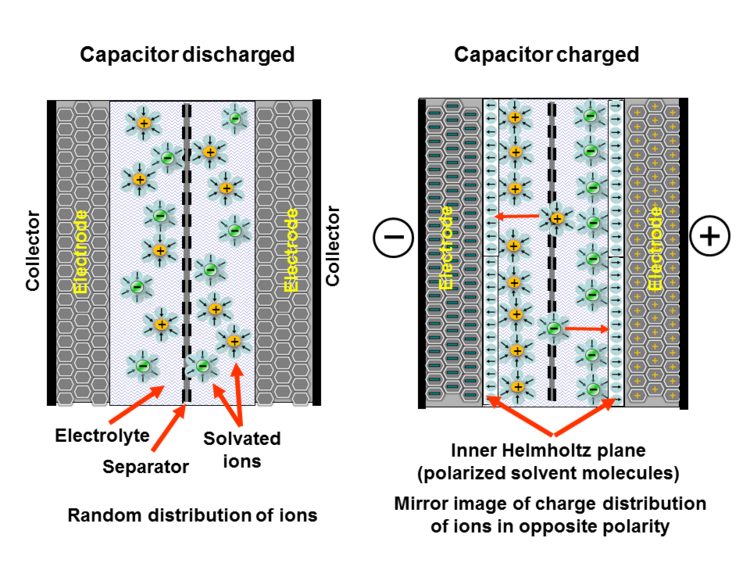Lithium-Ion vs Supercapacitor: Understanding the Difference in Dash Cam Batteries
Dash cams are an increasingly popular device to have in cars, but the batteries they use vary significantly between models. It can be difficult to understand why some dash cam batteries last longer than others and what this means for you as a consumer when trying to find the right product for your needs. In this article, we’ll take a look at the different types of batteries used in dash cams and explore how their features impact performance. We’ll also provide tips on how to get the most out of your battery life so that you always know where you stand with your new purchase.
The type of battery used in your dash cam makes all the difference in performance and longevity. Different batteries offer varying power output levels and lifespan depending on their construction and design. Capacitor batteries are often found in higher-end products and offer excellent durability, while lithium-ion is cheaper but holds longer charges. Understanding these differences is key if you want to ensure you are choosing the right dash cam for your needs.
What is a Dash Cam?
A dash cam is a small camera affixed to the dashboard or windshield of your vehicle. It records video footage while you’re driving so that if an accident happens, it can be used as evidence in court or for insurance claims. Dash cams are becoming increasingly popular due to their ease of use and potential benefits, but they come with some drawbacks. One major concern is the type and quality of the battery they use.
Types of Batteries Used in Dash Cams
A dash cam is a small camera affixed to the dashboard or windshield of your vehicle. It records video footage while you’re driving so that if an accident happens, it can be used as evidence in court or for insurance claims. Dash cams are becoming increasingly popular due to their ease of use and potential benefits, but they come with some drawbacks. One major concern is the type and quality of the battery they use.
The two main types of batteries used in dash cams are capacitors and lithium-ion batteries. Lithium-ion batteries are common and can last between 5 to 10 minutes on a full charge, enough to wake up and record an incident while your car is parked. A capacitor on the other hand does not hold a charge but will require a constant power source. While both have pros and cons, understanding which type best suits your needs can help with your overall experience.
Lithium-Ion Batteries
Lithium-Ion (Li-Ion) batteries are the most commonly used type of batteries in dash cams. Lithium-ion batteries work by storing energy electrochemically. When charged, electricity moves the lithium-ion to a material called the high-energy anode compound. During this time, these energy-filled lithium ions travel from the high-energy anode through a separator, to the low-energy cathode material. This process releases the energy, which is then extracted into a circuit. This process releases the energy, which is then extracted into a circuit. As shown in the schematic, over time, this cycle of charging and discharging causes the chemical compounds of the battery to slowly degrade. As a result, lithium-ion batteries will eventually hold a lower power density and lose their ability to store energy. This phenomenon can be seen in cell phones, laptops, and other portable electronics. Below are some pros and cons of using lithium-ion batteries in your dash cam:
Life Expectancy: Generally not recommended for long-term use.
Maintenance: Lithium-ion batteries will require you to replace your battery at some point.
Limited charge cycle. Battery degrades over time with repeated use.
Does not do well in hot or cold weather.
Easy to use and set up. Ideal for casual drivers.
Lithium-ion batteries may pose a serious risk of explosion and fire under prolonged exposure to extreme heat.
Cheaper to produce than capacitor batteries.
Capacitor Batteries
Capacitor batteries are a newer technology that offers some unique advantages over the traditional lithium-ion battery. Unlike lithium-ion batteries, which store energy in the form of chemical reactions, capacitor batteries store energy in the form of an electric charge. Because of the unique environment and extreme weather changes a dash cam is subject to, capacitor batteries perform better and are ideal to use than dash cams powered by lithium-ion batteries. Capacitor batteries are designed to withstand extreme temperatures and be a safer option when compared to lithium-ion batteries.
Life Expectancy: Reliable for long-term use.
In theory, capacitors can be charged infinitely.
Durable. Does well in hot or cold weather.
Capacitors do not hold a charge and will require a constant power source.
Usually more expensive.
Ideal for drivers who want to continue running the dash cam after parking.
Safer to use.
How Temperature Affects Dash Cam Battery Performance
Now that we’ve covered the two types of batteries used in dash cams, it is important to consider how temperatures inside your car affect your dash cam’s overall performance.
Lithium-ion batteries in particular tend to suffer from decreased lifespan and reduced efficiency in colder climates due to the chemical reactions inside them slowing down. On the other hand, extreme heat can cause the cells in lithium-ion batteries to overheat, leading to an irreversible decrease in capacity. To avoid any degradation of your battery, some dash cams offer temperature control features that automatically shut off the device when temperatures become too high or low.
Capacitor battery-powered dash cams on the other hand are designed to withstand extreme temperatures and have a longer life expectancy than standard lithium-ion cells. They are far more durable when used in extreme temperatures and do not experience any battery degradation. Instead, be mindful of running your dash cam for prolonged periods in extreme heat as the internal hardware may overheat and potentially become damaged. As a general rule of thumb, try to avoid running your dash cam when temperatures are high.
Knowing what type of dash cam to choose based on your own environmental factors, driving habits, and usage can greatly affect your dash cam experience. It's important to do your own research before choosing a dash cam that best fits your personal needs.
Charging And Maintenance Tips For Dash Cam Batteries
Now that you understand the differences between lithium-ion batteries and capacitor batteries, it's important to know how to charge and maintain them properly. To ensure a long lifespan, there are a few key things to keep in mind:
Make sure your dash cam is fully charged before using it. This will help extend its life by reducing stress on the cells.
Never leave your dash cam unattended while it is charging. By overcharging your device, you may cause “swelling” of the battery and damage the cells. Prevent overcharging by unplugging it as soon as it’s done charging.
Use an appropriate charger for the specific type of battery you have; otherwise this could result in decreased performance or even worse, explosion or fire.
Check your dash cam battery for any signs of wear and tear such as bulging or corrosion around the terminals. If these appear, immediately stop using and safely dispose of the battery according to local regulations.
Remove your dash cam when parked and when temperatures are expected to be hot.
Park under a shaded area.
By following these tips, you can help extend the lifespan of your device and battery.
FAQs
How Long Do Dash Cam Batteries Typically Last?
When it comes to the life of a dash cam battery, there is no one-size-fits-all answer. Different types and brands will. In general, most dash cam batteries are designed to last between 5-15 minutes unplugged. The life expectancy of your dash cam battery will depend on your usage and environmental factors. With regular care and maintenance, most dash cams should provide reliable service for years to come.
What Safety Features Are Available For Dash Cam Batteries?
Dash cam batteries come with a range of safety features, ensuring that they are safely operated and run as efficiently as possible. Some dash cams are equipped with overcharge protection, which prevents the battery from being overcharged beyond its capacity. Additionally, some models have built-in temperature sensors that will shut down the device when it gets too hot or cold.
These protective measures ensure that users maximize their benefits from their dash cam without worrying about potential hazards from faulty or damaged batteries. As such, understanding these safety features and how they work is essential for keeping your camera safe and reliable for years to come.
Conclusion
It's important to consider all the pros and cons before deciding on what type of battery best fits your needs. Both lithium-ion and capacitor battery options have their own advantages and disadvantages. Ultimately, the right choice will come down to your personal driving habits, environmental factors, and usage. If you need a camera for casual driving, a lithium-ion battery-operated dash cam may be the best choice for you. However, if you want all-around protection and durability, capacitor-powered dash cams may be the better choice.
Related Posts
Ask an Expert
Have a question? Reach out to our team and get the help you need. Live Chat available 9AM-5PM M-F PST.



